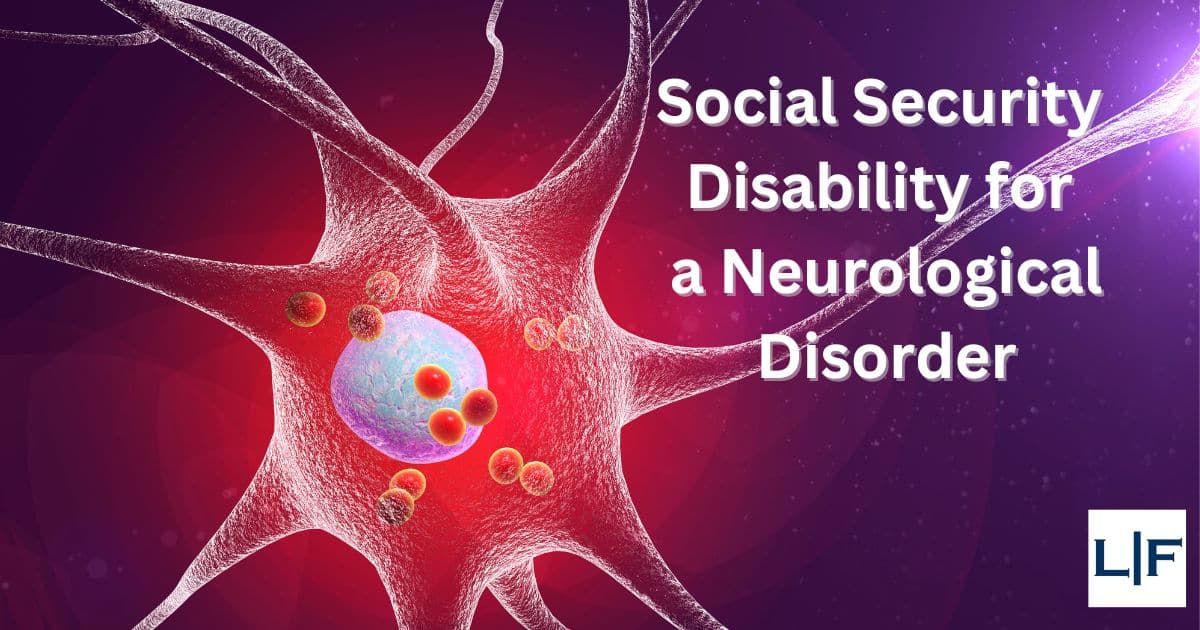Tens of millions of people suffer from some type of neurological disorder globally, reports the World Health Organization. Alzheimer’s, Parkinson’s, stroke, and epilepsy are some of the most common types of conditions people suffer from. Many neurological disorders affect more than the brain; they can involve the entire central and peripheral nervous systems.
The symptoms and signs of neurological disorders vary in type and severity, but many can cause marked limitations, such as:
- Paralysis and muscle weakness
- Seizures and tremors
- Problems communicating
- Memory and cognition problems
- Chronic, severe pain
- Involuntary movements
- Breathing problems
The Social Security Administration (SSA) considers many severe neurological disorders disabling. If you or your loved one has a serious neurological issue, you might be able to collect monthly Social Security disability benefits. For more information about getting Social Security disability for a neurological disorder in North Carolina, call Lunn and Forro, PLLC at 888-966-6566 for a free consultation.
What types of neurological disorders does the SSA consider disabling?
In Section 11.00 of the Blue Book, the SSA lists various neurological disorders and their severity criteria that claimants must meet. If claimants are able to meet the criteria, the SSA will consider them disabled. Some of the conditions listed include:
- Epilepsy
- Benign brain tumors
- Parkinsonian syndrome
- Cerebral palsy
- Spinal cord disorders
- Multiple sclerosis
- Amyotrophic lateral sclerosis (ALS)
- Muscular dystrophy
- Peripheral neuropathy
- Neurodegenerative disorders of the central nervous system, e.g., Huntington’s disease
- Traumatic brain injury
- Coma
How does the SSA evaluate disability claims for neurological disorders?
If the claimant has one of the listed conditions, the SSA will first look to see if the person’s condition meets the severity criteria. The criteria differ for each impairment. For instance, if the claimant is filing for disability based on multiple sclerosis, the guidelines stipulate that her condition must be characterized by one of the following two criteria:
- Disorganization of motor function in two extremities, resulting in an extreme limitation in the ability to stand up from a seated position, balance while standing or walking, or use the upper extremities; or
- Marked limitation in physical functioning and in either understanding, remembering, or applying information; interacting with others; concentrating, persisting, or maintaining pace; or adapting or managing oneself.
There are many instances where a neurological disorder can manifest itself in a combination of limitations and/or manifest concurrently with other conditions.
When this is the case, the SSA will evaluate a claimant under all appropriate listings. For instance, if a person has both MS and dementia, the SSA will evaluate her under both the neurological listing under 11.00 and the mental disorder listing under 12.00.
Does not meeting the criteria under a listing disqualify a claimant?
No. Meeting the criteria under a neurological disorder listing is only one way for the SSA to deem you disabled. The other way is proving that the impairments are so severe that there is no work the claimant can do.
If the claimant does not meet the requirements of the listing, the SSA will review her records and assess her physical and mental “residual functional capacity” or RFC. When the claims examiners review the application, they will perform an RFC assessment to see what basic skills the person still has, despite her impairments. If they find that, given the claimant’s impairments, age, education, and skills, there is no work she can perform, they may consider her disabled.
What are the other criteria for disability benefits?
In addition to having a neurological disorder that either meets the listing requirements or that is so severe that it greatly limits your ability to earn a living, there are several other criteria you must meet to obtain disability benefits:
- The impairment must have lasted or be expected to last a year or longer or result in death.
- You are so impaired that you cannot engage in what the SSA calls substantial gainful activity, which means you are incapable of earning more than $1,130/month.
- You meet the appropriate financial or work history requirements.
What are the financial or work history requirements for disability benefits?
The SSA provides two types of disability benefits. The requirements differ for each:
- SSI: Supplemental Security Income is for disabled children and adults with limited income and resources (and little to no recent work history). To be approved, the claimant’s income and the value of her assets must fall below a certain amount.
- SSDI: Social Security Disability Insurance benefits are for disabled workers that have adequately paid into the Social Security system. Income and assets are not a factor for SSDI, but the claimant must have a certain number of work credits on her record, depending on her age.
What kind of documentation does the SSA need to approve a disability claim?
The SSA will want to see all your medical and mental health records pertaining to your neurological disorder and its complications. The Blue Book stipulates: “We need both medical and non-medical evidence (signs, symptoms, and laboratory findings) to assess the effects of your neurological disorder.”
Some of the evidence the SSA will need include:
- Medical history
- Examination findings
- Relevant laboratory tests
- Results of imaging tests such as x-rays and computerized tomography (CT), magnetic resonance imaging (MRI), and electroencephalography (EEG) scans
- Descriptions of any prescribed treatment and your response to it
- Non-medical evidence such as your statement or statements from others about the impairments, the restrictions it causes, and how it affects daily activities and your effort to work
Lack of medical evidence is one of the primary reasons the SSA denies disability claims. It is essential to be well-prepared with evidence that supports the claim or risk facing a denial.
We help collect whatever documentation might be necessary to prove the claim, or to help appeal the claim if the SSA initially denies it. If the SSA has denied your claim, call us immediately so we can get started filing your appeal.
Get a free consult with a disability lawyer.
If you or your family member has a disabling neurological disorder, call Lunn & Forro, PLLC for a free consultation. We help people living with disabilities win the benefits they are entitled to. Contact us today at 888-966-6566 to see how we may be of service.
Related Posts

If I Get Disability Benefits Will My Family Also Get Money?
If you are approved for SSDI payments there may be additional money available to your minor children, your spouse, and your disabled adult children. When

Can Disabled Veterans Get Social Security Disability?
Disabled veterans may qualify for both Social Security disability benefits and veterans disability compensation. If you meet the separate requirements of each type of benefit,

How Long Can You Receive Social Security Disability Benefits?
You can receive disability benefits as long as you continue to be eligible. The eligibility rules are different for SSDI and SSI benefits.

Does My Spouse’s Income Affect Social Security Disability Benefits?
Yes, your spouse’s income may affect your Social Security disability benefits, although it depends on the type of benefit you receive.
Will I get Medicare or Medicaid benefits?
Medicaid and Medicare are medical benefits that come with a finding that you are disabled by the Social Security Administration. If you receive SSDI benefits,
Social Security Back pay
The Social Security disability application process can seem rather long and tiring. The Social Security Administration (SSA) receives roughly 2.5 million applications for disability benefits



